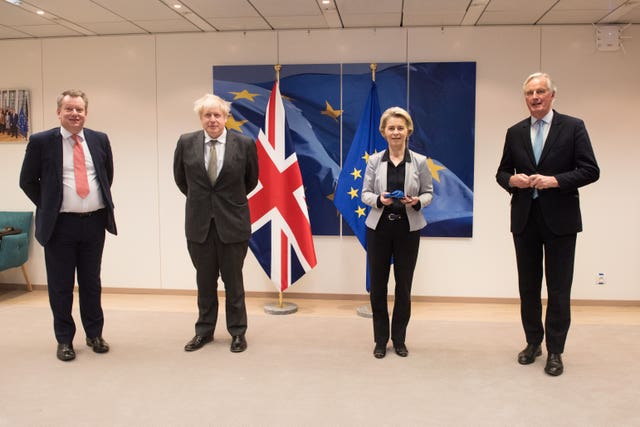
Rachel Johnson 7pm - 10pm
10 December 2020, 22:24

The Prime Minister said the current proposals would keep the nation ‘kind of locked in the EU’s orbit’.
Boris Johnson has warned there is a “strong possibility” that the UK will fail to broker a trade agreement with the EU as he ordered his Cabinet to prepare for no-deal at the end of the Brexit transition period.
The Prime Minister said the “deal on the table is really not at the moment right”, saying it would leave the UK vulnerable to sanctions or tariffs if it did not follow the bloc’s new laws.
He said the current proposals would keep the nation “kind of locked in the EU’s orbit”, but insisted negotiators would “go the extra mile” in trying to get a treaty in time for December 31.
But Mr Johnson said he told his Cabinet on Thursday evening to “get on and make those preparations” for a departure without a deal in place, or in an “Australian relationship” as he puts it.
“I do think we need to be very, very clear, there is now a strong possibility – a strong possibility – that we will have a solution that is much more like an Australian relationship with the EU than a Canadian relationship with the EU,” he said.
Elsewhere in the interview, he added: “So what I told the Cabinet this evening is to get on and make those preparations. We’re not stopping talks, we’ll continue to negotiate but looking at where we are I do think it’s vital that everyone now gets ready for that Australian option.”
The Prime Minister’s warning came after his dinner with European Commission president Ursula von der Leyen in Brussels on Wednesday failed to produce a breakthrough.
As the negotiators resumed talks, Ms von der Leyen set out no-deal plans for emergency legal agreements to keep planes flying to the UK and lorries crossing Europe.
The two leaders agreed that a decision on the future of the negotiations will be taken by the end of the weekend.
On Thursday, Ms von der Leyen said at a summit of EU leaders that negotiations are “difficult”.
In his first interview since the dinner, Mr Johnson said the UK will do “everything we possibly can” to get a deal when asked if it would be a failure of politics not to strike one.
He said he would be willing to return to Brussels, or head to Paris or Berlin to get a deal over the line, in a clear reference to French President Emmanuel Macron and German Chancellor Angela Merkel, who are seen as two figures adamant not to cave to British demands.
“At the moment, I have to tell you in all candour that the treaty is not there yet and that is the strong view of our Cabinet as well,” Mr Johnson added.
He said that sticking points include “equivalence”, which he said would keep the UK “locked” in the bloc’s regulatory orbit, and fisheries, which he said under current proposals would mean “we wouldn’t still have control of our waters”.
Negotiations are still ongoing but the end of the transition is near. There is no guarantee that if & when an agreement is found it can enter into force on time. We have to be prepared including for not having a deal in place on 1 January. Today we present contingency measures ⤵️ pic.twitter.com/FQ4Urn9YUC
— Ursula von der Leyen (@vonderleyen) December 10, 2020
Senior Tory backbencher Tobias Ellwood warned that a no-deal would cause “colossal” long-term damage to the UK economy as he urged the two sides to show “political courage” to broker an agreement.
“Let’s not walk away and cause a no-deal that would be devastating to not just Britain but to the European Union as well,” the chair of the Commons defence committee told BBC News.
Mr Johnson insists that the UK can “prosper mightily” under a no-deal but the Office for Budget Responsibility financial watchdog has suggested that a no-deal outcome could wipe 2% off gross domestic product – a measure of the size of the economy – in 2021.
Experts have indicated that could be around £45 billion.
Meanwhile, the EU contingency proposals for no deal included for Europe’s fishing boats to continue having access to UK waters next year.
In response, the Prime Minister’s official spokesman said: “We would never accept arrangements and access to UK fishing waters which are incompatible with our status as an independent coastal state.”
But he said the Government would “look closely” at the mini-deals proposed by the EU if there is no overall agreement.
The EU’s leaders were being updated by Ms von der Leyen on the state of play during the summit in Brussels.
The fact that negotiators Lord Frost and Michel Barnier were meeting again on Thursday at least gave some cause for hope.
Ireland’s Taoiseach, Micheal Martin, said an agreement is “within reach” as he arrived at the summit.

“I think the fact that they met for quite a lengthy period of time and that frank exchange of views in itself is a good thing, and the fact that the negotiators are mandated to go back in again and try to break the logjam,” the Irish premier said.
The UK has not ruled out the prospect of talks continuing beyond Sunday, but ministers stressed the need for “finality” in the process.
Foreign Secretary Dominic Raab said it is “unlikely” that talks will continue after that deadline, but added: “I can’t categorically exclude it”.
Negotiations have faltered over fishing rights, the level playing field – measures aimed at preventing the UK undercutting the EU on standards and state subsidies – and the way that any deal would be governed.